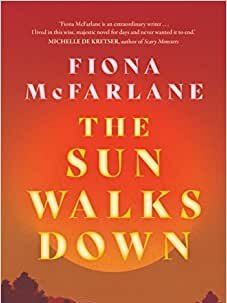Fiona McFarlane’s The Sun Walks Down offers fresh twist on missing child trope
Fiona McFarlane tells the story of a missing colonial boy with retrospective wisdom, writes Geordie Williamson.
If societies are made of the stories they tell about themselves, the narrative of the lost child is one Australians have repeated more than any other. Tales of boys and girls of European origin who have wandered into the bush and been lost – some to vanish forever, others to be wrested back from the continent’s vast indifference or outright hostility – have been a staple since colonial times.
For scholar Peter Pierce, the lost child was a “symbol of essential if never fully resolved anxieties within the white settler communities”. It stands in part “for the apprehensions of adults about having sought to settle in a place where they might never be at peace’’.
Fiona McFarlane’s second novel, The Sun Walks Down, is, in many respects, obedient to the traditional lost child narrative. Set in the late 1880s, on marginal agricultural country on the desert fringes of colonial South Australia, it describes the disappearance of a six-year-old boy, Denny, who becomes disoriented while collecting wood in a dust storm on his family’s hardscrabble farm. In the week that follows, many gather to assist in the search. Locals lend horses or hired hands. Police come with trackers. Women commiserate with the distraught mother. A scattered community coalesces around potential tragedy.
McFarlane comes late to this particular literary tradition. She cannot write from an innocent vantage. The Sun Walks Down instead takes the well-worn material of the lost child narrative and infuses it with retrospective understanding. The author tells an old story in ways that allow for commentary and critique to be embroidered, dexterously and unobtrusively.
This begins with McFarlane’s unblinking historical realism. The remote and isolated district, centred around a small town named Fairley, is brought to life with documentary fidelity. Clothing, furniture, manners, language, gender relations, class, race, agricultural practice and daily domestic chores: an entire constellation of mundane detail is assembled in a manner that drains any residual romance from the gap between then and now.
Instead we are given a picture of people and place teetering on the edge of survival (this country will soon be abandoned to the desert, we learn), with little margin for extravagant emotion or ancillary effort on Denny’s behalf. McFarlane’s decision to give narrative voice to so many locals – Indigenous stockmen and Irish maids, no nonsense prostitutes and self-regarding police, children just coming into self-knowledge and world-weary pastoral chatelaines – allows a complex and noisy democracy of perspective.

This same variousness serves to make the boy’s loss and his family’s suffering seem at once central and peripheral. Denny is lodged deep in the heart of his mother, the half-German daughter of a devout minister, who has married down to a good if emotionally inarticulate man. But the disappearance is no more than occasion for idle gossip for others; or irritation. Shearing season is about to start, after all.
The author’s hedging on this matter is strategic. As the inner lives and histories of the other characters emerge, so too does our sense of the damage suffered by those of Indigenous descent. Talents left fallow, language and lore stamped out, freedom of movement and action stymied by whites who are obtuse or unthinkingly cruel. There are so many lost black children in the narrative’s background that caring for one missing white child feels almost obscene: or would, if many of those same Indigenous characters did not act with such care to effect rescue. Denny, whose perspective we intermittently enter, offers a hint as to why he deserves such compassion. There is “something unhoused about the boy, as if he belongs in a shell from which he’s been prematurely shucked’’. His age and odd cast of mind make him an extraterritorial figure. He has not yet hardened into the ideological mould of his community. He only sees gods and monsters in the shadows and gullies through which he wanders, thirsty and trembling. And in this he is an admirable vessel for an author who permits herself some gorgeous visionary flights.
Gripping as this tale is, it is McFarlane’s language – sentences animated by a poet’s eye and an arch, questing intelligence – that raises the novel up. It is more evidence that the author is one of the legitimate talents of her generation.
Resisting the urge to indulge in a prefabricated version of Australian romanticism, McFarlane replaces it with a sterner, more stirring vision of our nation of lost children. She describes a land that will remain unsettling to those of us who do not properly belong – a country we have claimed yet from which we remain exiled.
Geordie Williamson is chief literary critic of The Australian. The Sun Walks Down, by Fiona McFarlane, Allen & Unwin, $32.99, 416 page




To join the conversation, please log in. Don't have an account? Register
Join the conversation, you are commenting as Logout